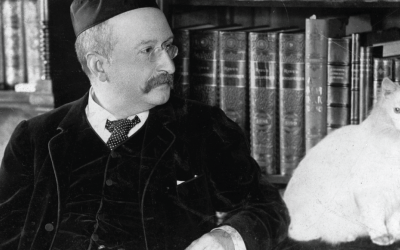Johnathan Walmsley introduces Descartes' method of doubt.
Descartes set out to destroy Aristotelean philosophy. He was entranced by the certainty of mathematical conclusions, and Kepler and Galileo had shown that mathematics had application to the natural world. Aristotle's philosophy placed no emphasis upon irrefutable certainty and relied upon consensus as a basis for knowledge. Nor did Aristotelean natural philosophy lend itself to mathematicisation. It was Descartes' aim to underpin his knowledge of the world with unshakeable foundations by importing the certainty of mathematics into the physical and metaphysical spheres.
This was no simple task - where was the purity of mathematics in the chaos of experience? To find the certainty he desired, Descartes had to remove any hint of doubt from the premises upon which he would build his new knowledge. It was his methodology at this point that set him apart from his predecessors. He chose not to rely upon popular opinion, or the writings of the ancients. He even questioned his own perceptions, opinions and knowledge. Rather than review each of his opinions individually, Descartes examined the foundation on which they were all based - perceptual experience. If this foundation was found wanting, the structure built upon it should be dismissed. Descartes recognised that his perceptual faculties misled him through illusion and hallucination. In dreams he had experiences which were not veridical. Perception produced only dubitable beliefs.
But the possibility of doubt was difficult to maintain against the vigour of sensation. To counter this weakness, Descartes supposed there was a powerful evil demon whose vocation it was to deceive us. Such a mighty creature would be well equipped to feed you sensations of all sorts. The world would seem to you as it does now, but there would be nothing corresponding to any of your perceptions. The scepticism engendered by this creature would cast doubt on all beliefs derived from sensation. All that remained after this epistemic cleansing would be certain.
But what was left? Certainly not the objects around me nor even my body. Knowledge of these was based on sensation and sensation could not guarantee certainty. What then could be known? Must I doubt the existence of everything? Might I doubt that I exist?
It is here that the doubt comes to an end. I cannot doubt that I exist - for, Descartes maintains, in this very act of doubting I am existing. 'I think', declared Descartes, 'therefore I am'. But what is the 'I' that exists? It is not some material thing - it is possible to doubt that all material things exist, but not that 'I' do. 'I' am a thinking thing and a thing, moreover, that certainly exists. This was Descartes Archimedean point, from which he would build the world. Yet in comparison to our former knowledge, this point seems hopelessly small. Where previously we had the richness of the entire world in which to believe, now we only have one small set of disembodied thoughts and memories. How can we move from this minute point of thought to the massive pageant of experience? Our knowledge of the world had to be constructed of the most solid of certainties. Descartes thought that such material could be found in God. If God truly existed, the things that we clearly and distinctly perceive must surely exist, as God is benevolent and would not allow us to be deceived. A demonstration of the necessary existence of God is thus crucial to Descartes' plan. It is consequently unfortunate that the arguments that Descartes advanced to prove the existence of God were all flawed.
Descartes did destroy Aristotle, but his own programme was a failure. However, this failure hardly lessens the importance of Descartes's approach - the radical nature of his strategy and the way in which he attempted to execute it. His emphasis upon mathematical certainty and universal law had a profound effect upon science. This soon found profitable expression in Newton's hands. Descartes' individualism propelled philosoph into modernity. But the sceptical spectre of the evil demon still haunts modern philosophical work - it is a possession that no one has yet managed to exorcise, except by neglecting to consider it in the first instance. Descartes was the making of science and the downfall of philosophy.
Suggested reading
Meditations, Rene Descartes (many editions)
Descartes, John Cottingham (Blackwell)
THIS ARTICLE ORIGINALLY APPEARED IN ISSUE 11 OF THE PHILOSOPHERS' MAGAZINE.





